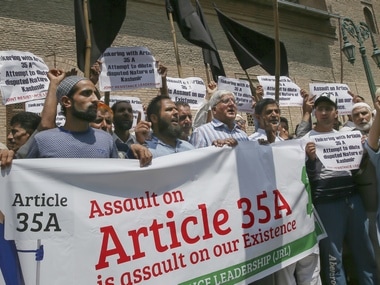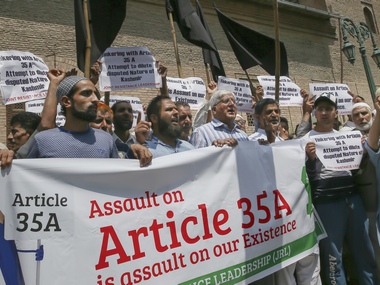A range of intelligence and other advisors in official positions have cautioned the Centre about the fiery reaction that might ensue in Kashmir if Article 35A ceases to be a part of the Constitution. Those charged with the task of negotiating with leaders and people in Kashmir are apparently among those who have communicated their concerns to the government. Some senior officials of think tanks associated with the ruling party are also said to be of the view that alternative possibilities for domiciliary rights ought to be explained to people at large in the state in preference to any precipitate action with regard to the Article. The Article was inserted into the Constitution in 1954, a year after Sheikh Abdullah was arrested, leading to turmoil in the Valley. The UN Security Council too was actively involved in trying to determine the future of the state at the time. It was two years before the States Reorganisation Commission divided the newly independent country into states afresh in 1956. Hence, no state had this sort of domiciliary exclusivity at the time. Since then, other hill states like Himachal Pradesh and Uttarakhand have also adopted domiciliary laws restricting land ownership within the state to long-time residents of the state. [caption id=“attachment_4897011” align=“alignleft” width=“380”]  Protests in support of Article 35-A in Jammu and Kashmir. AP[/caption] Ironically, neither of those states existed at the time. Himachal was carved out of Punjab in 1960, and Uttarakhand was separated from Uttar Pradesh in 1999. Hearing on Monday The matter has assumed critical importance since the Supreme Court is to take up a challenge to the Article on Monday, 6 August. There have been a slew of articles and social media posts from influential Kashmiris urging that the Article should remain part of the Constitution. Ironically, some of those who have written with great concern about the Article in recent days have also been backers of the ‘azaadi’ movement. The Article guarantees that only permanent state subjects may own property in the state, or be recruited to government jobs, and admitted to state-run educational institutions. Permanent residents have to prove that their families have been living in the state for several generations. The norms are determined under the laws of the state. The provision was originally introduced by Maharaja Hari Singh in January 1927. The primary intention then was to reserve government jobs for state subjects. Many higher posts in government used to be held by persons with origins in the Punjab until then. Multiple objections The Article has been impugned on several counts. One of these is that the Article should have been discussed and passed by Parliament before it was inserted into the Constitution. The counter-argument is that the President was authorised under the provisions of Article 370 to insert such an Article for the protection of the rights of state subjects of Jammu and Kashmir. Of course, most of the opponents of Article 35A also want to do away with Article 370. This, they hold, would demonstrate the full and final integration of the state into India. This has been a major campaign plank of the Bharatiya Jana Sangh, the predecessor of the BJP. This was the primary demand of the BJS when the party was founded by Syama Prasad Mookherjee in 1951. He had raised the slogan, `ek pradhan, ek vidhan, ek nishan’ (one premier, one constitution, one flag). At that stage, the head of the state’s government was known as prime minister. The state still has a separate Constitution, and a separate flag, which is required to fly alongside the national flag on state buildings and vehicles. Many BJP leaders, too, have insisted on this demand. Some of the current leaders of the ruling party, such as minister of state in the prime minister’s office, Jitendra Singh, have publicly pressed for this. Gender inequality The provision regarding the property rights of state subjects has also been impugned for discriminating on gender grounds. In fact, the Article itself is not discriminatory. But discrimination against women springs from the way the provision has been interpreted by those implementing it within the state. They have held that the children of a woman from the state who marries a non-state subject cannot be state subjects. This means that the properties of those with only daughters cannot be inherited by their grandchildren. On the other hand, not only the children but the wife, and even the widow, of a state subject may own property in the state.
The issue of Article 35-A has assumed critical importance since the Supreme Court is to take up a challenge to the Article on Monday, 6 August.
David Devadas is an expert on politics and geopolitics. Formerly a Senior Fellow at the Nehru Memorial Museum and Library, Visiting Professor at Jamia Millia Islamia, and Political Editor of Business Standard, he is currently Distinguished Fellow at the Institute for Social Sciences. He has written books on Kashmir, on youth, and on history. He has been a radio compere, guest faculty at JNU's Academic Staff College, St Stephen's College and Hindu College. He has worked for the Indian Express, The Hindustan Times, India Today, The Economic Times and Gulf News. His most impactful article, on a murder cover-up, prevented a Congress President from becoming prime minister. One led to the closure of an airline, and another created a furore and consequent clean-up in Delhi's health department. Several have correctly predicted election results in key states, and a series of reports from Srinagar made the government aware of how unsettled the situation there was in 1990. He is an alumnus of St Xavier's School, St Stephen's College, and the Indian Institute of Mass Communication. He has lived for extended periods in Geneva and Berlin, and has traveled to almost 50 countries. He enjoys various kinds of music, theatre, design, architecture and art. see more


)

)
)
)
)
)
)
)
)



